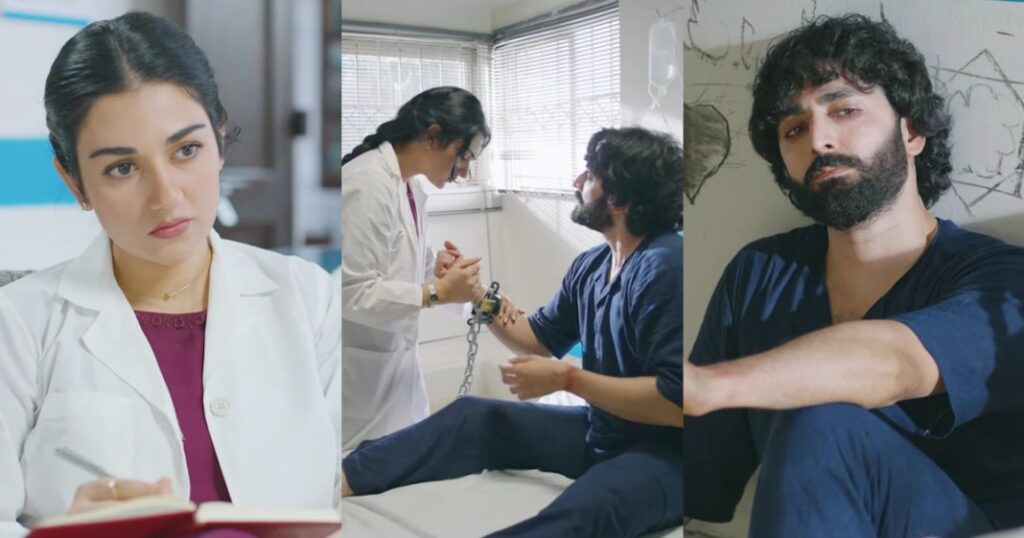Now Reading: Danish Taimoor’s ‘Sher’ Psych Ward Scene Sparks Viral Memes: A Wake-Up Call for Mental Health Portrayals in Dramas
-
01
Danish Taimoor’s ‘Sher’ Psych Ward Scene Sparks Viral Memes: A Wake-Up Call for Mental Health Portrayals in Dramas
Danish Taimoor’s ‘Sher’ Psych Ward Scene Sparks Viral Memes: A Wake-Up Call for Mental Health Portrayals in Dramas

In the ever-evolving world of Pakistani television, few actors generate online chatter like Danish Taimoor. Known for his dramatic flair and larger-than-life roles, his latest appearance in Sher has once again set social media ablaze — this time, not for a gripping storyline, but for a scene that’s become a meme goldmine. But beneath the laughter lies a critical issue that deserves our attention: the portrayal of mental health in Pakistani dramas.

The Scene That Broke the Internet
In a recent episode of Sher, Danish Taimoor’s character, Sher Zaman, finds himself in a psychiatric hospital after a personal and family crisis spirals out of control. The scene intended to depict his mental breakdown, instead, unintentionally veers into parody territory.
Sher is shown slumped on the floor of his psych ward room, surrounded by scribbled walls echoing phrases like “Shut up, I am sad”, “Kill me”, and even a random “Corona Virus” — all written in Urdu. To add to the absurdity, the room is decorated with framed images of brains, seemingly borrowed from a biology textbook or a Google image search, making the set feel more like a parody than a place of healing.
What pushed viewers over the edge, however, was the image of Sher shackled to his hospital bed — a disturbing visual that’s more reminiscent of a prison than a mental health facility. The message this sends? That those struggling with mental illness are dangerous, unstable, and need to be restrained. It’s not just factually inaccurate — it’s damaging.
The Meme Storm: Funny, But at What Cost?
The internet wasted no time. TikTok and Instagram were flooded with memes, commentary, and parody videos.
Some highlights include:
- “Me as a little kid in my room after my mom yelled at me.”
- “Trying to explain a logical point to desi coworkers — this is me.”
- “They really wrote Coronavirus on the wall 😭 why?”
- “Shut up I am sad — my new life motto.”
And while it’s easy to laugh (because honestly, the production choices are baffling), we also need to ask: Why is mental illness still treated like a joke in our mainstream dramas?
Why This Matters: Moving Beyond Outdated Stereotypes
This isn’t the first time Pakistani dramas have stumbled in portraying mental health, but it’s certainly one of the most glaring recent examples. And it’s a big step back from dramas like Main Abdul Qadir Hoon, which sensitively depicted a character’s mental health journey and personal growth.
We live in a time where awareness of psychological well-being is growing. More people are seeking therapy, talking about their struggles, and advocating for mental health support. Yet, television — one of the most powerful storytelling platforms — continues to lean on outdated and harmful tropes.
Instead of providing thoughtful narratives that reduce stigma, shows like Sher risk reinforcing the idea that mental illness is something grotesque, dramatic, and laughable.
A Call to Action for the Industry
It’s high time our drama creators — writers, producers, and actors — embrace their responsibility in shaping public perception. Mental health isn’t a trend or a backdrop for melodrama; it’s a serious, nuanced reality for millions of people.
By collaborating with mental health professionals, investing in accurate research, and portraying characters with empathy, the industry can play a crucial role in reshaping how mental illness is understood in our society.
Because when a psych ward scene becomes the butt of jokes rather than a moment of empathy, it says more about our storytelling than our characters.













